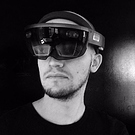For few months i was working on a C# bindings generator for Urho3D. I am at the point where while still experimental it already looks like it could be usable. Be aware that project is made with my fork in mind, which is a little bit different from upstream Urho3D. However things generator depends upon are few and minor and i would love to get them upstreamed.
A recap on the features:
https://github.com/rokups/Urho3D/wiki/C%23-support
Repository with bindings generator:
https://github.com/rokups/Urho3D
, build with
-DURHO3D_CSHARP=ON
.
Repository contains sample
102_CSharpProject
written in C#.
Differences from urhosharp:
- Also works with .net framework
- Supports inheriting c++ classes and overriding their virtual methods
- Supports multiple inheritance
- Supports serializing and deserializing managed objects without magical patches to the source
- Supports access of protected class members
- Getters and setters are converted to C# properties
Demo:
using System;
using System.Diagnostics;
using System.IO;
using Urho3D;
namespace DemoApplication
{
[ObjectFactory]
class RotateObject : LogicComponent
{
public RotateObject(Context context) : base(context)
{
UpdateEventMask = UseUpdate;
}
public override void Update(float timeStep)
{
var d = new Quaternion(10 * timeStep, 20 * timeStep, 30 * timeStep);
Node.Rotate(d);
}
}
class DemoApplication : Application
{
private Scene _scene;
private Viewport _viewport;
private Node _camera;
private Node _cube;
private Node _light;
public DemoApplication(Context context) : base(context)
{
}
public override void Setup()
{
var currentDir = Directory.GetCurrentDirectory();
EngineParameters[EngineDefs.EpFullScreen] = false;
EngineParameters[EngineDefs.EpWindowWidth] = 1920;
EngineParameters[EngineDefs.EpWindowHeight] = 1080;
EngineParameters[EngineDefs.EpWindowTitle] = "Hello C#";
EngineParameters[EngineDefs.EpResourcePrefixPaths] = $"{currentDir};{currentDir}/..";
}
public override void Start()
{
Input.SetMouseVisible(true);
// Viewport
_scene = new Scene(Context);
_scene.CreateComponent<Octree>();
_camera = _scene.CreateChild("Camera");
_viewport = new Viewport(Context, _scene, _camera.CreateComponent<Camera>());
Renderer.SetViewport(0, _viewport);
// Background
Renderer.DefaultZone.FogColor = new Color(0.5f, 0.5f, 0.7f);
// Scene
_camera.Position = new Vector3(0, 2, -2);
_camera.LookAt(Vector3.Zero);
// Cube
_cube = _scene.CreateChild("Cube");
var model = _cube.CreateComponent<StaticModel>();
model.Model = Cache.GetResource<Model>("Models/Box.mdl");
model.SetMaterial(0, Cache.GetResource<Material>("Materials/Stone.xml"));
_cube.CreateComponent<RotateObject>();
// Light
_light = _scene.CreateChild("Light");
_light.CreateComponent<Light>();
_light.Position = new Vector3(0, 2, -1);
_light.LookAt(Vector3.Zero);
SubscribeToEvent(CoreEvents.E_UPDATE, args =>
{
var timestep = args[Update.P_TIMESTEP].Float;
Debug.Assert(this != null);
});
}
}
internal class Program
{
public static void Main(string[] args)
{
using (var context = new Context())
{
using (var application = new DemoApplication(context))
{
application.Run();
}
}
}
}
}









 Just like something that would require wine in order to build things on linux. That is crazy
Just like something that would require wine in order to build things on linux. That is crazy



